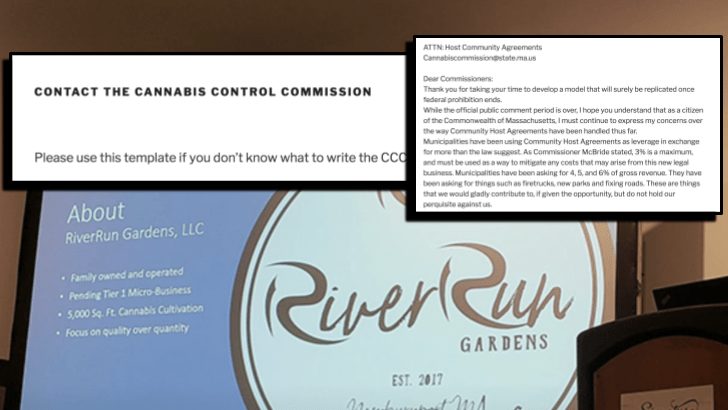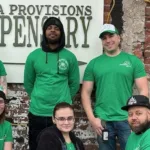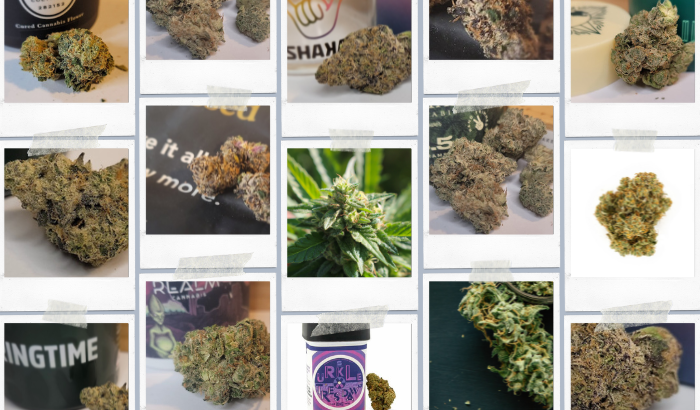
Local family-run Riverrun Gardens still fighting for a license
After receiving city of Newburyport Planning Board approval for a special permit for a small cultivation business in August, it looked like RiverRun Gardens would be one of the first locally owned micro applicants to get licensed by the Massachusetts Cannabis Control Commission.
That was then and this is now. Today, RiverRun is looking for a new home due to reefer madness, specifically opposition from the business condo association connected to its leased space at the address that received the special permit. So it’s back to step one. “We’re a free agent,” co-owner Ed Desousa told me in answering some questions I threw at him…
I’ve heard you mention no-till organic cultivation. What is that, and what makes your flower different than what I’m smoking from a dispensary now?
[It] is the process of growing crops without agitating the soil. The technique increases both water absorption and organic matter retention by reusing nutrients back into the soil. The difference with a no-tilling method is that it relies on its own natural organic bacteria, beneficial fungi, and living organisms to maintain the soil. In essence it provides the health-conscious cannabis consumers a more natural and organic product they can consume.
RiverRun is dedicated to our product. There is no automation. Our plants are individually handled every day to ensure the plant is getting exactly what it needs. A good analogy would be your massive chicken farm vs cage-free farm. Both will serve, but there is a distinguishable quality found in the cage-free egg.
Is this what makes your product craft?
Our product is grown and handled with love. We have a team that is ready to come to work because they love this miracle plant. We don’t view it as a “money crop” but rather “the miracle crop.” Our horticulturist and master grower make for an amazing team. Every plant, every strain is given exactly what it requires on a daily approach. You can’t assume “nutrient A” is to be used during veg and “nutrient B” during flower. You have to read the plant.
Our system is based on soil conditions, and we are big on microbes. If your foundation isn’t solid, the product will suffer. Another thing that separates us is the type of lighting we are able to use. Because we are a micro-business we are able to use DE lightning as opposed to LED. As you break down the development of the cannabis plant, you will learn what spectrums are best for what phases of the plant’s life. Being able to apply these spectrums appropriately mean the world to density and trichome development. All in all, it is the attention to detail. Some of the bigger companies are looking at a cubic foot with dollar tags; we view the cubic foot as someone’s medicine and treat it as such.
Any advice for smaller local players to win approval?
Don’t give up! You can have the best business plan, financial plan, etc. … but when you are in pursuit town approval, you are on full display. You need thick skin and an empathetic approach. The prohibitionists will come out and you will be called every name in the book. I have even been told my kids should be taken from me. But you can’t give up.
We are fighting for something that doesn’t come around very often: the end to an unjust war on cannabis. This is the oldest medicine in the world, and it has been villainized for the last 90 or so years. I also recommend advocacy work. If people see your passion they begin to believe. I honestly feel municipalities have a responsibility to their public’s best interest, which is why they are so hard and demanding when it comes to zoning and permits. But if they see you are passionate, if they see you at meetings, they will know that cannabis is a serious business and not just another attempt to ruin their town’s image and pollute the streets. You have to be an educator. The stigma is strong out there, and if you want to make it in the cannabis industry you have to fight to remove the stigma.
Do you have any suggestions for regulators to help the smaller local players get licensed and open?
Priority should have been given to micro-businesses and co-ops. The RMDs and large out-of-state entities don’t need it. They have money. In the end, money will get you things faster. For example, the other allowed cannabis business in Newburyport is an 86,000-square-foot company from Texas. They road our coattails while we were fighting for zoning. Then they swooped right in and got approved. We did the fighting, we were ridiculed, and they stayed silent and waltzed through. At our planning board hearing, I was attacked for over two hours. We complied with everything that was asked for us, but were delayed based on silly technicalities. The other company was approved in 15 minutes and had more technicalities than we had. So why do these entities get priority? A micro-business or a co-op are made up of local people who have scraped all the money they have in the world to get into the industry. If the state wants money to stay in state and jobs that pay a living wage, they would allow us an advantage in order to survive.
Any advice to cities and towns?
Education is everything. I travel the state in support of cannabis rights. I stand for other small businesses and their right to pursue the American Dream. You have over a year to learn the regs, to prepare for this new market, but municipalities are still being run in bias. Education is key to removing the bias and stigmas. Towns think if they zone, everyone is going to come out of the woodwork to set up shop. This isn’t the case. The barriers to entry are extremely high.
For one, it costs a minimum of $500,000 to get into this business. Then you must endure the permitting process, host community agreements, location, lease, abutters, etc. These are all very hard tasks. So what I like to say, you aren’t opening Pandora’s box, you are simply supplying an opportunity for someone like me to make a better life for others.
I would also like them to realize that by allowing the larger out-of-state entities, they are essentially driving money out of their town. A locally owned business is going to spend more in that town as they will use local labor, local resources, pay living wages, even offer equity in the company. These things don’t happen on the large scale. The larger the company, the more likely you are to be another number. With small businesses an employee becomes family.
Are you hiring? For what kinds of positions?
RiverRun isn’t hiring right now, not because we don’t need it, but because we can’t afford it. We have sunk everything in what we have and need to make our first sale before we can increase our workforce. So we have a very busy couple of months ahead of us. Once we get the ball rolling, we will be hiring. We are looking for people that are willing to learn, an intern, so to speak. Hopefully that intern will be creative and one day open their own business and keep the small business chain going. But as things move along we will need trimmers, bookkeepers, and other positions.
After a recent Cannabis Control Commission decision not to review/stop host community agreements from charging amounts beyond the law, a CCC move that hurts smaller players, DeSousa started the Facebook group “MA Citizens for Real Cannabis Rights” to organize around simple but seemingly achievable causes such as fair local community host agreements, social consumption and event licensing, delivery-only services, expediting licensing of micro-grows/co-ops and expungement for all cannabis “crimes.”

























